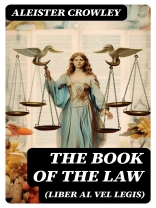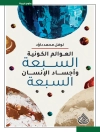In ‘The Book of the Law (Liber Al Vel Legis), ‘ Aleister Crowley presents a radical and complex philosophical system grounded in the principles of Thelema, a spiritual and ethical framework that emphasizes individual will and personal freedom. Written in a unique literary style that seamlessly intertwines poetry and prose, this work is both an enigmatic treatise and a prophetic revelation. Composed in 1904 during what Crowley claimed was a mystical channeling, the text articulates the revolutionary concepts of spiritual self-determination and the dichotomy of the ‘True Will, ‘ all while engaging with themes that echo across esoteric traditions and contemporary psychology, thereby situating itself within a broader context of early 20th-century occultism and avant-garde thought. Aleister Crowley, often referred to as the ‘Wickedest Man in the World, ‘ was a controversial figure whose life and works challenged the moral and spiritual norms of his time. His exploration of varied religious, mystical, and philosophical traditions equipped him with the insights necessary to articulate Thelema’s profound doctrines. Crowley’s experiences as an experienced mountaineer and a participant in various secret societies enriched his writings and philosophies, leading to a radical rethinking of the nature of authority and liberation. ‘The Book of the Law’ is a compelling read for those intrigued by the intersections of mysticism, psychology, and philosophy. It invites readers to question societal constraints and encourages a personal exploration of one’s purpose. Whether approached as a sacred text or a philosophical manifesto, Crowley’s work remains a vital tool for understanding human potential and spiritual autonomy, making it an essential read for seekers of truth.
लेखक के बारे में
Aleister Crowley (1875-1947), born Edward Alexander Crowley, was a figure of significant controversy, often referred to as ‘The Wickedest Man in the World.’ Crowley was an English occultist, ceremonial magician, poet, painter, novelist, and mountaineer. He founded the religious philosophy of Thelema, which proposed the dictum ‘Do what thou wilt’ as the foundation of its ethical law. Crowley’s most renowned writing is ‘The Book of the Law’ (Liber AL vel Legis), penned in 1904, which he claimed was dictated to him by a disembodied entity named Aiwass. This work serves as the central sacred text of Thelema and had a profound influence on the development of modern Western occultism and magic. Known for his prodigious literary output, Crowley authored numerous books, including ‘Magic, Book 4, ‘ where he details his theories on magick and ‘The Book of Thoth, ‘ which explores the symbolism of the Tarot. A polarizing intellectual, Crowley’s esoteric scholarship and extravagant lifestyle attracted both followers and critics. His literary style combined various elements, including mysticism, poetry, and instructional manuals on magical practices, often permeated with his wit, skepticism, and satirical flair. Despite his reputation, which was marred by allegations of immorality, Crowley’s work continues to be studied and celebrated within certain circles for its innovative approach to spirituality and morality.












